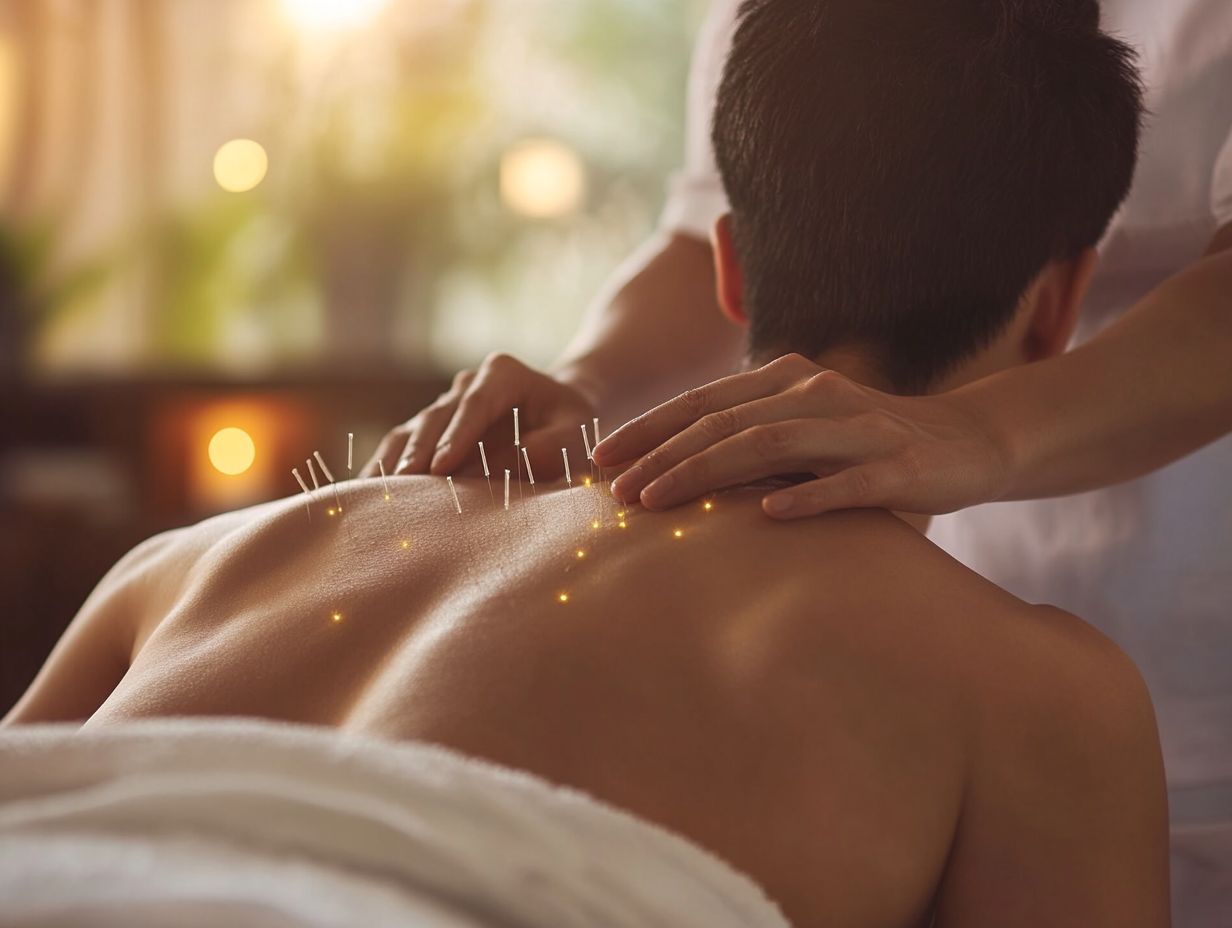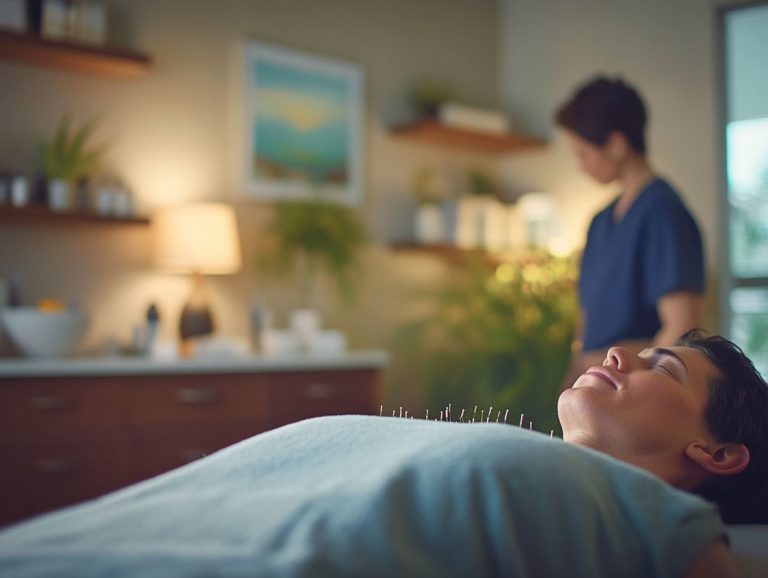5 Fascinating Facts About Acupuncture You Didn’t Know
Acupuncture, with its origins in ancient China stretching back over 2,500 years, remains a captivating and healing practice for people across the globe.
Rooted in the principles of Qi (pronounced ‘chee’) and meridians, this holistic therapy provides far more than mere pain relief; it addresses a variety of health conditions.
Here are five intriguing facts about acupuncture insights into how it works, its numerous benefits, and the myths that often cloud its reputation.
Discover how acupuncture can transform your wellness journey today!
Contents
- Key Takeaways:
- 1. Originated in China Over 2,500 Years Ago
- 2. Based on the Concept of Qi and Meridians
- 3. Can Be Used for a Variety of Health Conditions
- 4. Works by Stimulating Nerves and Muscles
- 5. Can Be Combined with Other Forms of Treatment
- Discover How Acupuncture Works!
- What Are the Different Types of Acupuncture?
- What Are the Benefits of Acupuncture?
- What Are the Risks and Side Effects of Acupuncture?
- What Can One Expect During an Acupuncture Session?
- How Can One Find a Qualified Acupuncturist?
- What Are the Common Myths About Acupuncture?
- What Does Research Say About the Effectiveness of Acupuncture?
- Can Acupuncture Help with Mental Health Issues?
- How Can One Incorporate Acupuncture into Their Wellness Routine?
- Frequently Asked Questions
Key Takeaways:

Acupuncture has a rich history and has been used for over 2,500 years in China. The practice is based on the concept of Qi and meridians, and can be used to treat a variety of health conditions. However, there are many common misconceptions about acupuncture that can lead to misunderstandings about its benefits. By stimulating nerves and muscles, acupuncture can provide relief and improve overall well-being.
1. Originated in China Over 2,500 Years Ago
Acupuncture, an ancient practice steeped in Traditional Chinese Medicine, dates back over 2,500 years to its origins in China. It emerged as a comprehensive system designed to promote health and wellness.
You might recognize its rise to international acclaim, particularly following President Nixon’s visit to China, which showcased its potential effectiveness for various health concerns. The New York Times coverage around that time further cemented its status as a legitimate treatment option within the modern healthcare landscape.
Over the centuries, acupuncture has undergone considerable evolution. It has adapted to various cultural interpretations while staying true to its foundational principles.
When it made its way to the West in the 20th century, a surge of interest prompted rigorous scientific exploration. Major studies emerged, seeking to validate its efficacy and leading to broader acceptance within Western medical paradigms.
This fusion of ancient wisdom and contemporary research has allowed acupuncture to be seamlessly integrated into holistic treatment plans. It effectively addresses a range of conditions from chronic pain to stress management, thereby creating a bridge between Eastern tradition and Western medicine.
2. Based on the Concept of Qi and Meridians
The practice of acupuncture centers around the concept of Qi, an essential energy that flows through your body via specific pathways known as meridians. This underscores the intricate relationship between your physical health and the flow of energy.
In Traditional Chinese Medicine, Qi is viewed as the vital life force that nourishes not just your physical well-being, but also your emotional and spiritual health. By understanding how energy circulates through these meridians, practitioners can pinpoint blockages or imbalances that may lead to a range of health issues.
Each acupuncture point corresponds to unique bodily functions. For instance, stimulating points along the liver meridian can enhance liver health and alleviate symptoms related to stress.
The dynamic interplay of Qi within this meridian system serves as a foundational framework for both diagnosis and treatment. Therefore, it s essential for practitioners to grasp these intricate theories while seamlessly applying them in their hands-on practice.
3. Can Be Used for a Variety of Health Conditions
Acupuncture is celebrated for its remarkable versatility as a treatment option. It is effective in managing a wide range of health concerns, from chronic pain and gastrointestinal issues to enhancements in your immune system and emotional well-being. For those interested in learning more, understanding the basics of acupuncture can provide valuable insights.
This ancient practice has shown efficacy in managing conditions like migraines, arthritis, insomnia, and even mood disorders such as anxiety and depression.
Numerous studies and clinical trials support the notion that after a series of personalized acupuncture sessions, many individuals often experience significant symptom relief. For example, an extensive review published in the Journal of Pain underscored acupuncture’s ability to alleviate chronic pain more effectively than many conventional treatments.
Patients frequently share testimonials highlighting not just physical healing but also an overall sense of well-being. This showcases how acupuncture can be customized to meet specific health needs, providing a truly holistic approach to treatment.
4. Works by Stimulating Nerves and Muscles
Acupuncture stimulates your nerves and muscles through the precise placement of stainless steel needles. This technique promotes healing and provides an effective treatment for pain, facilitating your body’s natural recovery processes.
When these needles are inserted, they trigger physiological responses, such as the release of endorphins and neurotransmitters that influence how you perceive pain. This interaction soothes inflammation and enhances circulation, vital for tissue repair.
Various techniques within acupuncture cater to specific needs, including dry needling and electro-acupuncture. For example, dry needling targets trigger points in muscle tissue, while electro-acupuncture uses electrical impulses for increased stimulation.
These techniques are particularly beneficial for chronic pain and play a significant role in post-injury recovery, accelerating healing and restoring mobility.
5. Can Be Combined with Other Forms of Treatment

Acupuncture can be integrated with other treatment modalities, such as herbal medicine, Tui Na, and Tai Chi, offering a holistic approach that enhances your therapeutic experience.
By developing integrative treatment plans, you can embark on a multifaceted healing journey. Pairing acupuncture with herbal medicine amplifies pain relief while supporting your body s natural restorative processes.
Incorporating Tui Na helps mobilize stagnant energy, while Tai Chi promotes fluidity and balance, effectively reducing stress and anxiety. This comprehensive method addresses both physical discomfort and emotional well-being.
Embracing this holistic framework can lead to optimal healing results tailored to your unique needs.
Discover How Acupuncture Works!
Acupuncture addresses vital energy stagnation and restores balance within your body, effectively treating various health concerns while enhancing overall well-being.
This ancient practice, rooted in traditional Chinese medicine, promotes the smooth flow of energy, or Qi, throughout your meridians. When Qi is obstructed, it can lead to ailments such as pain and stress, highlighting the importance of proper circulation for optimal health.
Modern studies show that acupuncture stimulates neurotransmitters, enhances blood flow, and encourages the release of natural painkillers. By merging ancient philosophies with contemporary research, practitioners find compelling evidence supporting acupuncture s effectiveness in managing chronic pain and anxiety, ultimately improving your health outcomes.
What Are the Different Types of Acupuncture?
You ll find various acupuncture styles and techniques, each designed to deliver unique therapeutic interventions tailored to your health needs.
Traditional acupuncture focuses on balancing your body s energy by inserting needles at specific points. Japanese acupuncture is known for its gentle needle techniques and a nuanced approach, emphasizing diagnosis through abdominal palpation.
Auricular acupuncture targets points on the ear, making it effective for addiction recovery and enhancing emotional well-being.
Each method incorporates distinct techniques, offering various pathways to improved health outcomes.
Ready to explore the benefits of acupuncture? Consult a professional for personalized advice today!
What Are the Benefits of Acupuncture?
Acupuncture offers a wealth of benefits, from alleviating chronic pain to enhancing emotional well-being and overall wellness. It is a vital element of integrative healthcare.
This ancient practice, deeply rooted in Traditional Chinese Medicine, has found its place in contemporary therapies. It effectively addresses a range of health issues, including migraines, arthritis, and anxiety.
Research indicates that acupuncture triggers the release of endorphins and other neurotransmitters. This helps ease pain and instills a sense of tranquility.
Many patients recount transformative experiences. They share how their sessions have alleviated insomnia and stress while nurturing a profound connection to their mental well-being.
By supporting alternative healing methods, acupuncture powerfully addresses both body and mind!
What Are the Risks and Side Effects of Acupuncture?
While acupuncture is generally safe, it’s essential to understand the potential risks and side effects, especially when conducted by licensed acupuncturists who strictly follow safety protocols.
You might experience common side effects like mild soreness, bruising, or slight bleeding at the needle insertion sites. These reactions are typically short-lived.
To minimize discomfort and any adverse effects, it s crucial to communicate openly with your practitioner about your health history and any concerns you may have.
By choosing a qualified acupuncturist, you significantly enhance your chances of a positive experience. Safety measures are prioritized throughout your treatment.
What Can One Expect During an Acupuncture Session?

During your acupuncture session, you can expect a serene and tranquil environment. Skilled practitioners utilize thin acupuncture needles to target specific points, ensuring a comfortable experience tailored just for you.
Before the session begins, you’ll typically engage in a thorough consultation. This allows the practitioner to delve into your health history, current symptoms, and specific concerns.
Once the consultation is complete, the practitioner will gently insert the needles with finesse. You may notice a subtle sensation during this process, which can be surprisingly pleasant.
After the needles are in place, you can relax for a while, often feeling sensations of warmth or tingling. After your session, drink plenty of water and take time to relax to boost your treatment’s benefits.
How Can One Find a Qualified Acupuncturist?
Finding a qualified acupuncturist is essential for effective treatment. Seek out licensed acupuncturists who meet professional standards, and check whether your health insurance covers acupuncture services.
Beyond verifying credentials, explore the acupuncturist’s experience and specialization. Reading online reviews can provide valuable insights into the patient experience.
Don t overlook the importance of a clean, professional environment. Discussing techniques and treatment plans during an initial consultation can clarify whether the practitioner aligns with your health goals.
This thorough approach enables you to make an informed decision. Ultimately, this maximizes positive outcomes and enhances your overall satisfaction.
Are you curious about what acupuncture can do for you? Book a session today to explore its benefits!
What Are the Common Myths About Acupuncture?
Despite its long-standing presence in the wellness world, you might still encounter many misconceptions about acupuncture. These misunderstandings can breed skepticism regarding its efficacy and safety, but dispelling popular myths about acupuncture is crucial to appreciating its true value.
One common myth you may hear is that acupuncture is nothing more than a placebo effect. However, many studies have demonstrated its effectiveness for a range of conditions, from chronic pain to migraines and even anxiety.
Safety concerns often creep in, with some believing acupuncture could lead to injury or infection. In reality, when performed by a trained professional, the risks are minimal.
Perhaps you’re worried about discomfort during the treatment. Many people discover that the sensation of the needles is more akin to a gentle prick than anything painful. For a surprising number, it turns out to be a wonderfully relaxing experience.
What Does Research Say About the Effectiveness of Acupuncture?
Research on acupuncture has experienced a remarkable surge in recent years, with many studies showcasing its effectiveness for various health concerns. This has solidified its position within both traditional and modern medicine.
These studies reveal promising results in treating conditions like chronic pain, anxiety, and migraines, prompting healthcare practitioners to reconsider its therapeutic potential. The expanding body of evidence suggests that acupuncture may enhance the effectiveness of conventional treatments, encouraging integrated approaches that harmoniously blend Eastern and Western medical practices.
As more healthcare providers acknowledge the benefits of acupuncture, its acceptance within mainstream healthcare continues to grow. This progress paves the way for broader research and potential insurance coverage, ultimately making holistic care more accessible for those seeking alternative treatment options.
Can Acupuncture Help with Mental Health Issues?
Acupuncture has emerged as a promising ally in addressing mental health challenges, such as anxiety and depression, by fostering relaxation and emotional equilibrium through its distinctive approach.
This ancient art involves the careful insertion of thin needles at specific points on your body, believed to stimulate your nervous system and enhance the flow of energy, or ‘Qi,’ which is the vital energy believed to flow in our bodies.
Numerous studies have suggested that acupuncture may lower cortisol levels the notorious stress hormone resulting in diminished feelings of anxiety.
For example, a clinical trial published in the Journal of Alternative and Complementary Medicine revealed that participants who received acupuncture reported substantial reductions in their anxiety symptoms.
Many patients share testimonials about remarkable improvements in mood and overall well-being after several sessions.
Mental health professionals increasingly recognize acupuncture as a valuable complementary therapy alongside traditional treatments, highlighting its growing acceptance in integrated care models.
How Can One Incorporate Acupuncture into Their Wellness Routine?

Incorporating acupuncture into your wellness routine can yield remarkable health benefits, enhancing both your physical and emotional well-being while embracing holistic practices.
To truly unlock its potential, consider blending acupuncture with complementary activities like yoga or Tai Chi. These practices not only boost your flexibility and strength but also nurture mindfulness, creating a harmonious balance between your mind and body.
Dietary adjustments can further amplify the effects of acupuncture, supporting your body s natural healing processes. It s essential to establish realistic treatment goals that align with your overall wellness aspirations.
This approach ensures steady progress and fosters a deeper understanding of how acupuncture can seamlessly integrate into your health journey.
Frequently Asked Questions
What is acupuncture?
Acupuncture is a form of traditional Chinese medicine that involves inserting thin needles into specific points on the body to stimulate natural healing and improve overall health and well-being.
How long has acupuncture been around?
Acupuncture has been around for over 2,500 years and is one of the oldest continuously practiced medical systems in the world, with many people discovering 5 reasons acupuncture is gaining popularity.
Discover the amazing benefits of acupuncture today! Explore this holistic therapy and consider trying out popular acupuncture techniques for yourself.
How does acupuncture work?
According to traditional Chinese medicine, acupuncture balances the flow of energy, known as qi (pronounced “chee”), throughout the body. Western medicine suggests it stimulates nerves, muscles, and connective tissue. This can increase blood flow and trigger your body’s natural painkillers.
Can acupuncture help with pain relief?
Yes! Acupuncture effectively treats various types of chronic and acute pain, including back pain, neck pain, and headaches. You’ll find it can also manage pain from conditions like fibromyalgia and arthritis.
Are there any risks or side effects of acupuncture?
When performed by a trained and licensed practitioner, acupuncture is generally safe. Some people may experience mild side effects like bruising, bleeding, or soreness at the needle insertion sites.
Always inform your practitioner about any medical conditions or medications before starting treatment.
What are some other benefits of acupuncture?
Acupuncture offers many health benefits. It can improve digestion, reduce stress and anxiety, boost your immune system, and promote better sleep.
You can also use it as a complementary treatment for conditions like infertility, asthma, and chemotherapy-induced nausea. Discover how acupuncture can transform your health today!






